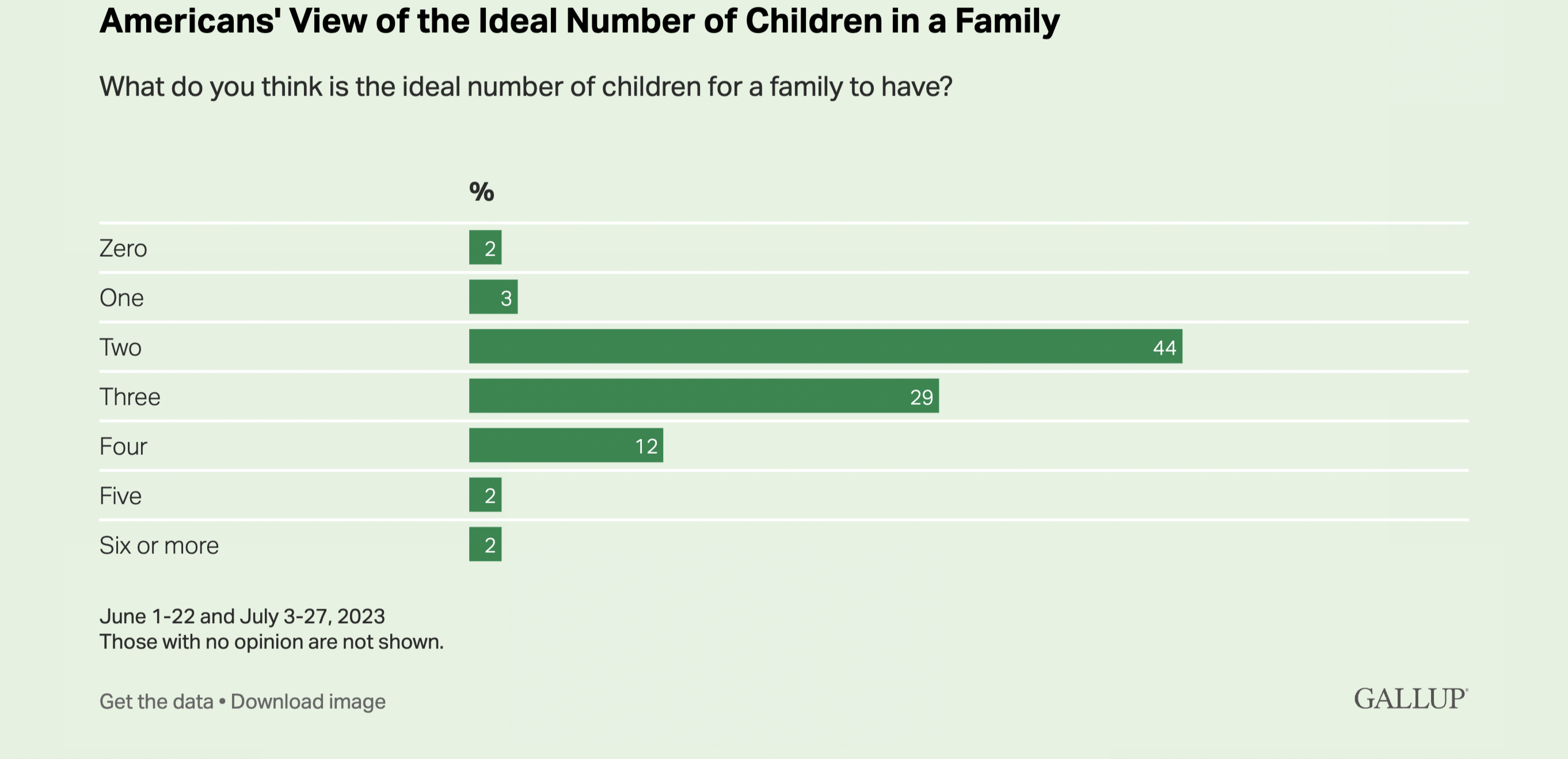Why would anyone not want a large family?
Personal life satisfaction increases, as an absolute matter, with the size of the family.
A growing number of people in America prefer families of three or more children, hitting the highest desire for large families since 1971.
According to a Gallup survey released Monday, the number of people who prefer smaller and larger family sizes are statistically tied, bouncing back from a decadeslong trend of believing one or two children was ideal.
“Overall, this recent survey shows that Americans might finally be climbing out of the anti-family bomb shelter caused by the myths of the 1960’s of a population explosion disaster,” Terry Schilling, the president of the American Principles Project, told the Washington Examiner. “Favoring more children is a sign that Americans are returning to basic principles and values that life was made for — bringing forth the next generation through the family.”
Forty-five percent now favor larger families, with 29% finding three children as ideal, 12% who prefer four, and 2% each who prefer five, six, or more.
That is compared to 47% who believe two or fewer children is ideal, with 44% preferring two children and 3% preferring one. Two percent believe the ideal family should not include children.
Gallup pointed to several social trends from past decades that may have contributed to the decline in having children, including the preference for larger families “plummeting” from 70% in 1967 to 52% in 1972 “fueled at least in part by concerns about a global population explosion, resulting from the 1968 bestselling book entitled The Population Bomb.”
The organization started tracking this data in 1936, when 64% preferred three children, reaching a peak in 1945 at 77%. However, by 1973, the strong preference for families of one or two children became the norm, evidenced by the 50% drop in children-per-family from the peak of the baby boom to 1.8 children in 1980.
What stands out to Schilling, however, is that only 8% do not wish to have children, leaving over 90% with the desire for children at any amount.
“The 8% of America that’s anti-family has way too much representation in our culture — especially in entertainment, politics, news media, academia, and even corporations,” Schilling said.
Gallup notes that people under the age of 30 are at least twice as likely to say they do not want children, but the “vast majority” continue to prefer having children. Twenty-one percent of that age group already has children, and 63% hope to have children in the future.
Moreover, 69% of those who already have children want more, as well as 15% of 18- to 40-year-olds who want to be parents someday. Six percent of childless people aged 41 and older also wished they had children.
While ideal family size is not significantly different from men to women, other demographic traits do trend in certain directions.
Young people aged 18-29 are more likely than any other age group to prefer larger family sizes, and black and Hispanic people are also more likely to prefer larger families. In addition, Republicans, conservative independents, and lower-income residents tend to prefer families with more children.
By contrast, Democrats, non-religious, and wealthy residents are more likely to prefer only one or two children.
Despite stated preferences, birth rates have been on the decline, and adults are starting families much later in life, which is highly correlated to smaller family sizes.
In 2021, the Centers for Disease Control and Prevention reported the average age of a woman who had her first child was 27.3 years, a record high.
Part of the answer for fertility declines, author Melanie Notkin writes in a piece for the Institute for Family Studies, is that much like the effect of The Population Bomb in the 1960s and 1970s, “we have a similar trend with the rise of anti-natalism where its nihilistic supporters believe the world is too sad a place to bring children into, along with climate change ‘doomerism.’ More practically, the current economy makes family forming more challenging for many young Americans.”
This negative cultural stuff from the Jews could be winding down. There are many signs of that.
But it will not leave without a fight.
Stupid peasants just buy whatever bullshit the Jews sell them
 Daily Stormer The Most Censored Publication in History
Daily Stormer The Most Censored Publication in History



